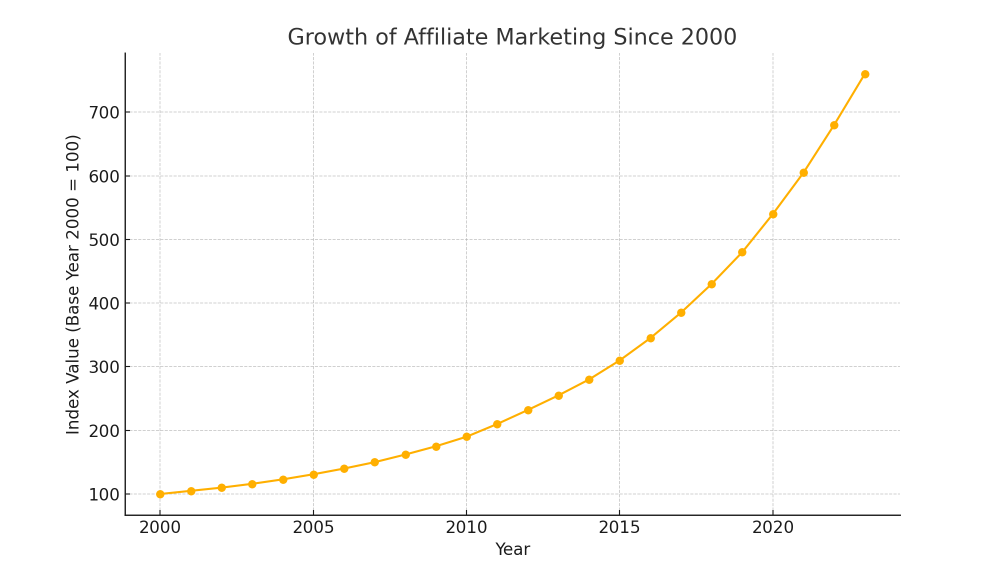
By now, just about everyone has heard of affiliate marketing. You might not know exactly how it works, but you may have heard a lot of buzz around it lately. I will tell you why affiliate marketing has become the go-to side hustle and, for some, even a full-time gig.
There’s been a massive wave of people looking for ways to earn extra income, and affiliate marketing has caught their attention as a great way to do that. Now, if you are wondering why, it’s simple: with the tools at our disposal today, an affiliate marketing venture can be set up during your coffee break.
WordPress makes it push-button simple to get a site up in seconds. AI technology makes it so you can write an article in minutes. Of course, you will want to spend some time polishing the article with your own ‘voice,’ but the point is that there is nothing difficult about building a website and creating content these days.
And that’s just scratching the surface. The allure of affiliate marketing isn’t just about the ease of getting started. It’s about the powerhouse combo of low startup costs and potentially high rewards. To make it work, you have to work it. There’s no such thing as get-rich-quick in business. If someone tells you otherwise, they are selling you snake oil.
Affiliate marketing is especially attractive if you’re starting out and don’t have a lot of capital. Thanks to the Internet, you’ve got a virtually unlimited audience. That means your potential for success isn’t limited by location—it’s global!
Digital entrepreneurship is reshaping what we thought was possible for earning money. Platforms like blogs, YouTube, and podcasts have democratized content creation, and affiliate marketing opportunities have soared.
It doesn’t matter if you’re a graphic designer from Jakarta or a fitness guru from Cleveland. If you’ve got valuable content and a dedicated audience, you’ve got a shot at making affiliate marketing work for you.
Affiliate marketing offers a way to try business without the risks traditionally associated with starting a company. And let’s face it: the appeal of affiliate marketing will only grow as we see more success stories and innovations in the industry.
As an aside, there are many success stories in affiliate marketing. Just search for it, or you can follow me to the platform where I work, and I can show you plenty of success stories from people of all ages, backgrounds, and education levels.
You might think, ‘All this sounds great, but what’s driving its growth? How is affiliate marketing evolving?’ The answer will include examining technological advancements, the paths paved by social media influencers, and the role of consumer behavior shifts. So hang tight because, in the next section, we’ll discuss the growth and evolution of affiliate marketing.
Evaluating the Growth and Evolution of Affiliate Marketing
The reasons behind affiliate marketing’s growth are cultural. It’s not a story about one entrepreneur who got lucky; it’s about technological and social shifts. At the heart of its expansion is the digital revolution, allowing affiliate marketing to evolve from a niche marketing strategy into a dominant force in the digital world.
To understand why affiliate marketing is growing, a look at the numbers is essential. The compelling data from recent studies show that this industry is on a steady incline and shows no signs of slowing down. This growth trajectory is fueled by the continuous rise of e-commerce and the ever-expanding online marketplace. It’s also interesting to note that as industries diversify, so does affiliate marketing, stretching its tendrils into sectors far beyond traditional retail.

Since 2000, affiliate marketing has grown significantly, evolving alongside digital marketing and e-commerce. In 2022, the industry’s global worth was estimated at around $12 billion and is expected to reach $15.7 billion by 2024 (Influencer Marketing Hub). In the U.S. alone, affiliate marketing spending reached $8.2 billion, reflecting a robust 10.8% year-over-year growth (Backlinko).
Different sectors have experienced varying growth rates. For instance, the home and garden sector reported an exceptional year-over-year growth of 209.72%, showcasing it as the fastest-growing affiliate marketing sector recently (MarketSplash). Conversely, the beauty industry saw more modest growth at 17.24% year-over-year (MarketSplash).
Affiliate marketing strategies also adapt to changing technologies. Notably, 79.3% of affiliate marketers are utilizing AI-driven tools for content creation, indicating a significant embrace of new technology to enhance marketing efforts (MarketSplash). Moreover, mobile devices have become crucial, accounting for over half of all affiliate referral traffic, emphasizing the need for mobile-optimized affiliate marketing strategies (DemandSage).
This growth and adaptation underscore the dynamic nature of affiliate marketing, reflecting both the opportunities and challenges within the industry.
Social media platforms and influencers have become the new frontier for affiliate marketing. The powerful combination of influencer reach and affiliate marketing strategies has proven immensely successful. This synergy has allowed for a more organic and authentic way of product promotion, driving impressive sales numbers.
Staying abreast of innovations in affiliate marketing is essential for anyone considering this field. In the next section, I’ll examine the current state of affiliate marketing. We’ll explore whether it’s still a viable option in 2024 and try to predict where it’s headed in the future. Understanding the challenges and opportunities that lie ahead is crucial for making informed decisions about whether or not to hop on the affiliate marketing train.
The Viability of Affiliate Marketing in 2024 and Beyond
If you’re pondering whether affiliate marketing still holds its ground in 2024, the short answer is an emphatic ‘YES’. Growth statistics indicate a continued upward trend, but that’s not the whole story. I will help you understand the layers that suggest affiliate marketing’s staying power.
Sure, the online market is extraordinarily competitive. That will include affiliate marketing, so you must sharpen your skills and differentiate your approach. Nonetheless, agility and adaptation could secure your place within this evolving landscape.
Here’s a critical point: the burgeoning fields of AI and automation are double-edged swords. While they offer incredible tools for affiliate marketers to personalize and scale up, they also raise the competition bar. Your content and strategies have to be not just good but GREAT to stand out.
I want you to see this as an opportunity, though. Technological advancements that might increase competition also provide new platforms and creative ways to engage with your audience. The future of affiliate bots and personal assistants could be groundbreaking, opening doors we can barely imagine right now.
The winners in the affiliate marketing arena will be those who embrace ever-evolving technology and combine it with personal skill and artistry.
Dave
Now, transitioning into monetization, let’s talk numbers and reality. Are you wondering how much you can make with affiliate marketing? You’re not alone. In the next section, we’ll uncover earning potential and debunk some myths floating around out there. It’s crucial to approach this with a clear head—the flashy success stories are real, but they’re not the norm.
Monetizing Through Affiliate Marketing Myth vs. Reality
You’re probably curious about the bottom line: Are people genuinely earning money with this? I’m here to tell you they are. But there’s a caveat–it’s not a ‘get-rich-overnight’ escapade. Successful affiliate marketers will tell you that success requires strategy, patience, and consistent effort.
We often hear stories of individuals who have struck gold through affiliate marketing. While these tales are true, they don’t represent the entire picture. For every success story, countless others might not have reaped substantial rewards. It’s essential to approach affiliate marketing with realistic expectations and understand that results vary widely.
Several key factors contribute to the potential for monetary success in affiliate marketing. Your niche selection, the strength of your marketing strategies, engagement with your audience, and the quality of the products or services you’re promoting all play pivotal roles. Those who find the sweet spot within these elements often see positive outcomes.
“I want to do affiliate marketing, but what if I pick the wrong niche, have weak marketing strategies, poor engagement skills, and lackluster products?”
Let me answer this with a question. Were you the best at your workplace when you started any of your jobs? Did you get better, even good or great, at them over time? Affiliate marketing is no different. You start out being terrible at it, then get better and better over time until you are great at it, and when you are great at it, the sky is the limit.
Furthermore, the most important aspect of your affiliate marketing career is where you choose to learn the ropes. I believe I know the absolute best place in the world to learn affiliate marketing: Wealthy Affiliate Marketing. It has everything you need under one roof to build a thriving business for a very low starting price. Plus, you can look for free and kick the tires, so to speak.
As we look down the road, it’s clear that affiliate purchase marketing isn’t going anywhere. As all sectors do, it will likely evolve with technological changes and consumer behavior. Being adaptable and continuously refining your abilities is paramount to staying ahead of the curve.
In conclusion, I want to stress that affiliate marketing is a marathon, not a sprint. It holds vast income potential but requires a strategic mindset and the willingness to learn and adapt. If you’re considering affiliate marketing, go into it with eyes wide open, a commitment to deliver value, and the understanding that your first attempt doesn’t need to be perfect. With dedication and the right approach, you can be part of the success stories in the thriving affiliate marketing world.
Dave

Yourturnmarketing.com
